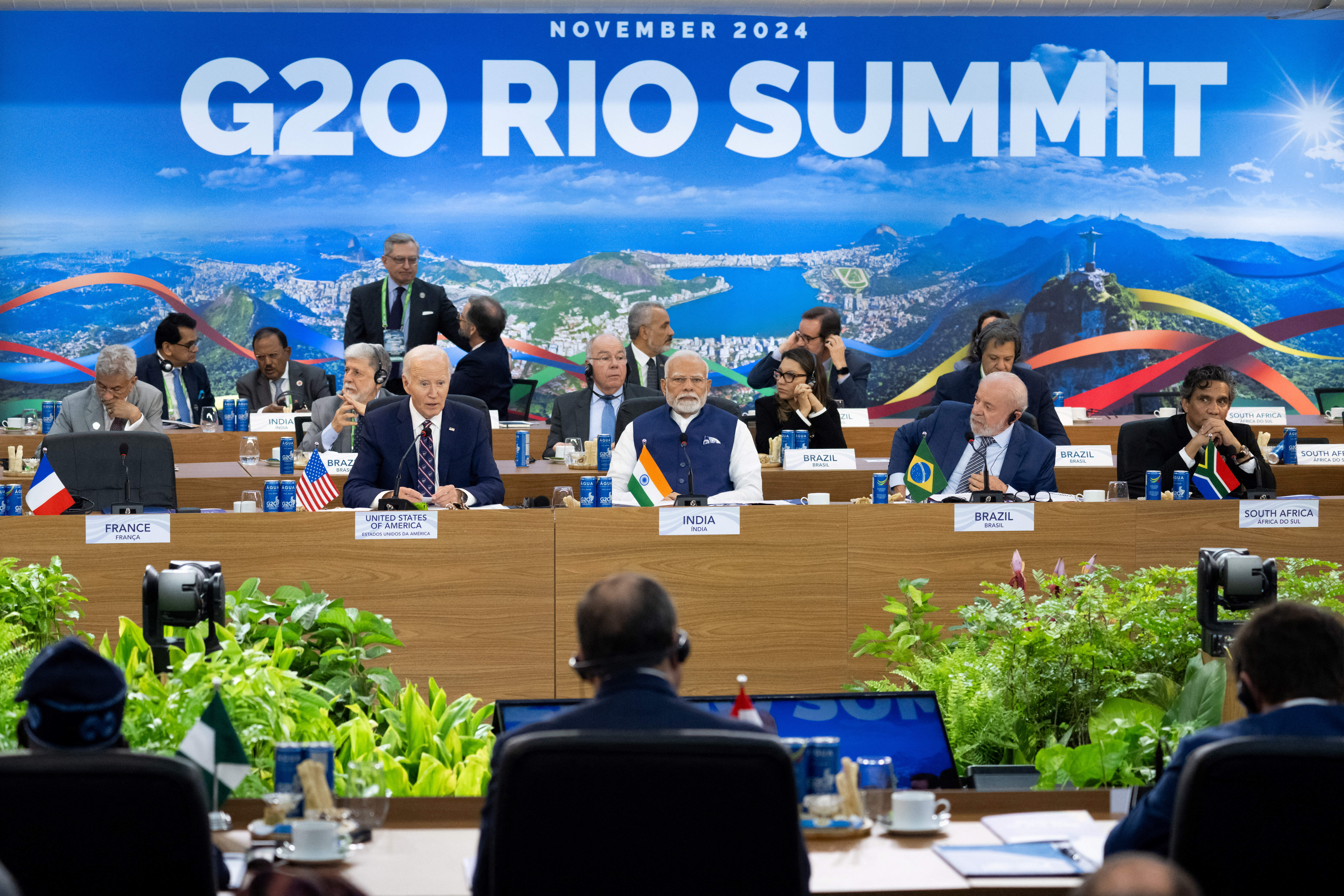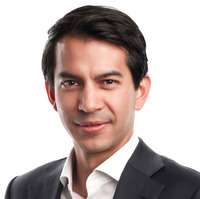The Group of Twenty (G20) met recently in Rio de Janiero, Brazil, on the heels of a seismic U.S. presidential election that has the potential to accelerate an already rapidly changing geopolitical landscape. Four Council of Councils experts weigh in on what they saw as the the meeting's successes, failures, and missed opportunities, while asking what is next for this group comprised of the world's largest economies.

G20 Rio Leaders Declaration: What’s Missing Matters
The 2024 Group of Twenty (G20) Leaders’ Summit convened in Rio de Janeiro, Brazil, earlier this week as the world grapples with war, rising protectionism, and worsening climate change.
In the past, the G20 has sent strong, unequivocal signals on each of those critical issues. And, as a grouping of leaders of the world’s largest militaries, economies, and emitters, its pronouncements carried weight.
But with Donald Trump’s reelection as U.S. president hanging over the Rio summit and the most fractious geopolitical backdrop in decades, this year, the G20 underdelivered on each of those fronts.
On war, for the second year running, the G20 Leaders Declaration refrained from explicitly condemning Russia’s invasion of Ukraine—something it had managed to do in 2022 when Indonesia chaired the summit, but dropped last year under India’s chairmanship. Some have interpreted this as a weakening of international resolve on the war in Ukraine. But more accurately, it reflects Russian obstructionism, tacitly supported by non-Western members such as China and India.
On trade, G20 leaders failed to issue a clear statement against protectionism in the face of a global slide away from open, rules-based trade. Most egregiously, Trump has threatened to impose 10 to 20 percent tariffs on all imports into the United States, and 60 percent tariffs on Chinese goods, which could spark trade wars with China and Europe. A call from the world’s most powerful economies to resist all forms of protectionism would have been an important signal to the rest of the world before Trump takes office. But such unity was extinguished under the first Trump presidency and has not reemerged under Joe Biden.
On climate, many had hoped the G20 Summit would reaffirm a landmark global commitment, agreed at last year’s UN climate summit in Dubai (COP28), for countries to transition away from fossil fuels. But with G20 member Saudi Arabia, among others, attempting to walk back that commitment at COP29 in Azerbaijan, it was never going to be easy.
As Trump prepares to again withdraw the United States from the Paris Agreement on climate change, trust on this issue is abysmally low between rich and poor countries. Despite this, Brazil, which is also hosting next year’s UN climate summit (COP30), will have been working hard behind the scenes to push major economies to put forward new ambitious emissions-reduction pledges by February 2025.
The G20 has the potential to make an impact when it most matters. In 2009, during the global financial crisis, the G20 helped avert a deeper global downturn by mobilising trillions of dollars in fiscal stimulus. Last year, the G20 encouraged the tripling of renewable energy capacity globally—which was adopted as a key commitment at COP28.
As an institution, the G20’s strength has been its balance between including the world’s most powerful governments while avoiding some of the divisions that plague broader groupings. But in 2024, there is no hiding from geopolitical fragmentation, particularly when the key antagonists are in the tent.
G20: More Representation, but So Far Ineffectual
If an intergovernmental body wishes to be effective, it has two issues that it needs to manage: representation and implementation. As the post–World War II institutions have waned in influence, other global initiatives have begun to try to fill the vacuum. The UN Security Council is locked through vetoes, thus presenting few opportunities to address pressing issues.
“G20” is a misnomer, as, in addition to the European Union, the African Union (AU) is now represented, as well as special guests that are invited according to each presidency’s wishes. Not having a permanent secretariat has some advantages, as it gives each presidency flexibility in choosing matters to discuss while the troika provides some continuity.
Topics have mostly focused on economic, financial, and trade issues which, of course, have political elements. However, due to the composition of the group, the G20 has so far not been able to make important political decisions. Although many countries in the BRICS geopolitical bloc (whose membership has grown from Brazil, Russia, India, China, and South Africa to also include Egypt, Ethiopia, Iran, and the United Arab Emirates) are critical of the West, the founding members are also part of the G20, which could make it a better forum for discussing political matters in more detail.
The G20 could also be expanded according to pressing issues or ones that call for immediate attention. For example, on climate matters, those countries that would be most affected could be invited. Nevertheless, the most important point would be to implement any decisions that are made. However, there seems little appetite for any such developments.
The decision to hold the summit after the presidential election in the United States was sensible. Now that we know the result, President-Elect Donald Trump’s go-it-alone view on global affairs could have disruptive long-term effects on the G20 and other multilateral entities.
While the world is in the throes of an emerging new order, a global forum where no one view would dominate and where all countries could have an equal say would be beneficial. However, this seems to be wishful thinking. Due to the disparity and lack of will or interest of the parties, it seems that the G20 will follow other international institutions in which little, if any, meaningful progress is made for the foreseeable future.
From Symbolism to Substance: 2025 Is an Opportunity to Advance Africa's Agenda
While the African Union’s 2023 debut as a G20 member was celebrated as a historic achievement, the real test lies in converting symbolic representation into tangible outcomes for the continent. This year’s summit occurred just days after COP29 began in Baku, Azerbaijan, and amid the ongoing wars in the Middle East and Ukraine, a fragile global economy, and Donald Trump’s reelection in the United States. Balancing geopolitical tensions with pressing issues such as climate action and debt relief set a challenging stage for South Africa and the AU to advance an African agenda. Yet, it is also an unprecedented opportunity for South Africa’s upcoming presidency to cement progress through post-summit efforts.
This year’s G20 summit in Rio de Janeiro spotlighted uncomfortable topics for the West, such as international tax reform, equitable redistribution, and global governance reforms—issues that challenge the status quo and demand systemic change. With the rising prominence of coalitions like BRICS, African states are steadily enhancing their bargaining power through strategic alliances. However, they need to carefully balance those relationships to avoid alienating vital global partners.
Next year, when South Africa takes the baton of the G20 presidency, it plans to harness the momentum following Indonesia, India, and Brazil’s consecutive developing-country presidencies. Over those presidencies, the priorities of developing nations—such as strengthening global health systems, advancing sustainable development, and pushing for reforms in international financial institutions—have been brought to the forefront of the G20 agenda. To do this effectively, it will place Africa at the heart of the G20 agenda. Under the theme of Fostering Solidarity, Equality, and Sustainable Development, South Africa will aim to address the polycrisis of inequality, poverty, and unemployment—inching towards “the Africa We Want” set out in the AU’s Agenda 2063.
Despite some recent advances, multilateral cooperation will likely face increasing strain in 2025. For South Africa and the AU, decisively advancing an African agenda while confronting the headwinds of a fractured world is crucial to prevent Africa from being sidelined. The road ahead demands not just vision but action: Africa’s leaders should seize this moment to redefine their continent’s role in shaping a more equitable and resilient global future.
The G20 in Brazil: The Role of Leadership in the Time of Political Change, Economic Tensions, and Social Discontent
The priorities of the Brazilian government going into the G20 Summit in Rio de Janeiro were fighting hunger, poverty, and inequality; energy transitions and sustainable development (social, economic, and environmental); and global governance reform.
During its G20 presidency, Brazil promoted the idea of taxing the fortunes of multimillionaires at a rate of 2 percent per year. It also promoted adhering to the Global Alliance against Hunger and Poverty initiative, signed by all the heads of state participating in this year’s summit and born of Brazilian President Luiz Ignacio Lula da Silva, who, in my view, had a guiding influence on the whole thematic agenda of the meeting.
At the end of the summit, it could be concluded that the unity of the meeting had been salvaged, but no real consensus was reached on pressing global challenges. Some minimal agreements were reached with respect to the wars in Ukraine, Gaza, and Lebanon in a communiqué, but neither Russia nor Ukraine were explicitly mentioned in the item.
Regarding the climate fight, the G20 outcome document does not define whether climate finance should come only from developed countries or if it should also include contributions from emerging economies. Nor does it mention the gradual abandonment of fossil fuels, which was assumed at COP28 in 2023.
In addition, the G20 warned that new technologies such as artificial intelligence contribute dramatically to disinformation and hate speech, according to the final declaration signed by leaders at the summit in Brazil.
Finally, and in spite of all that was not achieved, my conclusion is that the G20 remains an arena for discussion and the exchange of ideas among the world’s foremost political leaders. It is once again taking on a fundamental dimension at a moment of crossroads, and is an excellent platform for unravelling antagonisms, rebuilding trust, and threading together solutions through direct and personal contact.










